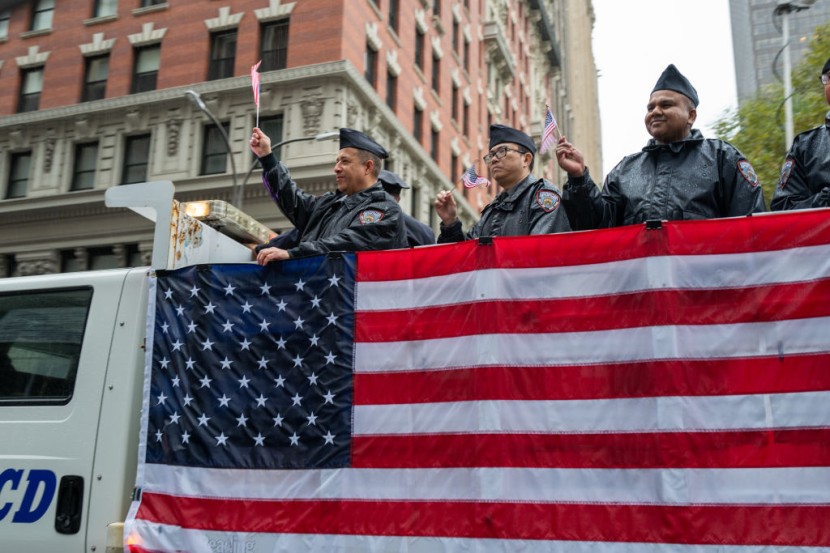November 11 is the anniversary of the end of the First World War, known as Armistice Day in Europe. The UK and France particularly commemorate the anniversary through parades by veterans of all conflicts since the Great War.
Across the pond - in the US - it is also called Veterans Day, which also holds similar parade traditions but also other related programs.
In both places, the public expresses their gratitude to veterans for their service to their respective countries. However, US veterans told a recent survey that people should do something beyond words to express their gratitude.

USAA Poll Shows Veterans Seek More than Verbal Gratitude
According to a poll commissioned by military-focused financial services company USAA, around 70% of younger military veterans felt uncomfortable or awkward when someone said "Thank you for your service," while three out of four veterans aged 65 and above said they were content with the greeting.
A military veteran who identified himself as "SnooStories2744" on the social media platform Reddit said Veterans Day made him upset because most civilians use the day to have a party and do not understand the essence of the commemoration.
"I also hate hearing 'Thank you for your service,'" he said, "Don't thank me. ... How about you lend an ear to a local old veteran and listen to his stories and knowledge? Why don't you volunteer to assist vets in need?"
The same survey also found that 28% of civilians were either unaware of Veterans Day or were not sure why people celebrate it.
It was also observed in the study that younger veterans harness the use of social media to connect with fellow veterans, while the older ones still prefer to meet up in person.
"This data shows that military service members and our veterans want Americans to go beyond small talk to connect with them on a deeper level, including learning more about their service [and] honoring each veteran's service in ways in which they feel comfortable talking about," USAA senior vice president and retired Maj. Gen. Robert F. Whittle said.
Meanwhile, Rush University Medical Center clinical director and military veteran Michael B. Brennan added that he heard a range of opinions both for and against the greeting "Thank you for your service," with both sides having a valid perspective on the matter.
In his 2017 Psychology Today article, Brennan recalled usually feeling honored when someone said it to him when he was on active duty. While not seeing any combat, Brennan still took great pride in his time in the military.
"I would often feel uncomfortable about running errands after work because if I entered a store, a restaurant, or other establishment that was away from a military installation, I would usually stick out," he wrote. "I often felt awkward and hyperconscious, like people were staring at me or that I always had to be on my best behavior so that I represented the Army in a positive way."
Read Also : UK Minister Asks Met Police to Halt Pro-Palestine Protests in London's Cenotaph on Veterans Day Weekend
Some Concrete Ways to Help Vets
The Washington Times reported about the ways people could support veterans. One of them is mental health and the effects of war and military deployment could do to one's mind.
UT San Antonio Health Science Center clinical psychologist Katy Dondanville said establishing personal connections is one critical component of veterans' mental health.
"Rather than simply offering our thanks, we should be looking for ways to go beyond small talk and create more meaningful connections with veterans and better understand their service," she said.
Another way people could help veterans out of genuine gratitude is for people to offer and provide access to veterans to get on with their lives as they return to civilian life.
Louisiana Tech University history professor and Iraq veteran John Worsencroft said the greeting "Thank you for your service" and similar comments are cultural rituals that might be heartwarming but offer little tangible support to veterans. The Marine veteran added that the hallmark of actual support in exchange for military service was the GI Bill, which was implemented in the aftermath of World War II to provide benefits for an untold number of veterans.
"Millions of service members received monthly cash payments after they mustered out of the military, accessing low-interest loans to start businesses, as well as low-cost mortgages and, the most celebrated benefit, money for college," Worsencroft wrote in the Washington Post in 2020. "This not only recognized the scale of their contributions to the United States, but because of the sheer size of the returning veteran population, the GI Bill became an engine of postwar economic growth in the United States."
Other practical ways people could do that veterans would appreciate include picking up the tab for a vet at a restaurant, attending Veterans Day events, shopping at veteran-owned businesses, or volunteering at organizations supporting veterans.
On balance, Brennan concluded, veterans would appreciate both words and actions of gratitude people would say to and do for them.
"Many civilians and veterans alike have good intentions when they say the phrase, 'Thank you for your service,'" he said. "In most cases, it is highly likely that their intentions are to acknowledge the sacrifice and selfless service that many veterans and service members have made."
Related Article : Research Shows Unemployed Veterans are Increasing








